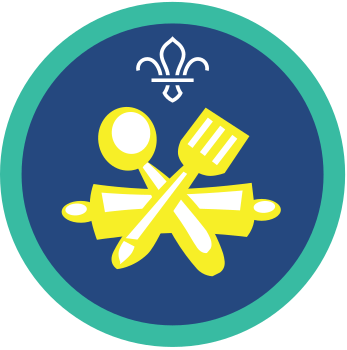
Perfect pakoras
You’ll need
- Ingredients (see recipe)
- Hob
- Knives
- Chopping boards
- Mixing bowls
- Wooden spoons
- Plates
- Baking trays
- Deep pan
- Slotted spoon
- Kitchen roll
- Apron
Before you begin
- Use the safety checklist to help you plan and risk assess your activity. There's also more guidance to help you carry out your risk assessment, including examples. Don’t forget to make sure all young people and adults involved in the activity know how to take part safely.
- Make sure you’ll have enough adult helpers. You may need some parents and carers to help if you’re short on helpers.
Pakoras are fritters originating from the Indian Subcontinent. They are made from chopped vegetables (mostly potatoes and onions) covered in batter made from gram flour and deep fried.
Many Muslims from the Indian Subcontinent eat pakoras as part of their iftar meal during Ramadan, when they break their fast.
- Ramadan is the ninth and holiest month of the Islamic year. Ramadan is a very spiritual month for Muslims, and an important time for self-reflection and gratitude.
- There are five pillars of Islam: the declaration of faith (Shahadah), praying five times a day (Salah or Salat), giving money to charity (Zakat), fasting during Ramadan (Sawm) and pilgrimage to Mecca (Hajj).
- Fasting means a certain length of time without either eating and/or drinking certain things, or sometimes without eating and/or drinking anything at all.
- During Ramadan, Muslims fast from sunrise to sunset. Iftar is the nightly meal that breaks the fast after sunset.
- You could run our kitchen safety and hygiene activities, Kitchen risk bingo and Home kitchen hygiene prior to running this session.
- Remember to have a hand washing station and take extra hygiene precautions when handling food. Take a look at our guidance on food preparation.
- Make sure you have all the ingredients ready.
- You may want to run a fire safety talk or show people how to use the equipment safely, such as for cooking or chopping ingredients.
- Remember to check for allergies, eating problems or dietary requirements and adjust the recipe as needed. Make sure you've checked everyone's dietary requirements and allergies then adapted the recipe as appropriate. This may include ensuring no cross-contamination during food preparation, too.
- Check if there are any items of food (or packaging) that people can’t touch or be near to or if there are items that people might not be comfortable using in the activity.
- Some people may not like certain food textures or tastes and that’s OK. Try to find an alternative for them. No-one has to use all the ingredients or be made to try foods if they’re not happy, comfortable or don’t want to.
Getting ready to cook
- Gather everyone together in a circle and tell them you’re going to make pakoras. Pakoras are crispy vegetable fritters, usually made with gram flour and flavoured with spices. They’re a popular snack and street food from South Asia.
- You may want to run a fire safety talk or show people how to use the equipment safely, such as using the cooking source or chopping ingredients.
- Ask everyone to wash their hands before cooking.
Pakoras recipe
Ingredients:
- 3 onions
- Half a bag of washed spinach
- Half a bunch of fresh coriander
- 1 green chilli
- 1 tablespoon turmeric
- 1 tablespoon garam masala
- 1 tablespoon whole cumin seeds
- 4 tablespoons of gram flour
- Vegetable oil
- Salt to taste
- Water
- Yoghurt to serve (optional)
Serves: 4 to 6
Prep time: 30 minutes
Cook time: 5 to 10 minutes
Make your pakoras
This can get messy, so make sure you have a suitable space and aprons.
- If they haven’t already, everyone should wash their hands.
- Carefully peel and slice the onions into thin strips and put them into a bowl.
- Carefully roughly chop the spinach and combine with the onions in the bowl.
- Add in the whole cumin, turmeric and garam masala, and a little salt.
- Rub the chilli between your hands, pull off the top, and use the knife to split it down the middle. Carefully scrape out the seeds, then finely chop the flesh and add it to the bowl. Remember – there’ll be chilli all over your hands after this step. Make sure you wash them thoroughly before you touch your face or go to the toilet.
- Finely chop the coriander and add to the bowl, then mix everything together.
- Allow the mixture to sit for 15 minutes. This will draw out the natural juices from the onions.
- Add the gram flour into the mixture one tablespoon at a time. Keep mixing, so it coats the vegetables and sticks together, but don’t let it get clumpy. Add a little water, if needed, to adjust the consistency.
- With adult supervision, add oil to a deep pan and put it on a medium to low heat. An adult should keep a close eye on the oil throughout.
- Prepare a baking tray by covering it with some kitchen towel. This is where you’ll place your pakoras once they’re cooked.
- An adult should check whether the oil is hot enough by adding a small piece of vegetable into the oil. The piece of vegetable should sizzle and cook if the oil is ready. You want the oil to heat up to around 180 degrees C.
- Once the oil is hot, with adult supervision, slowly place a spoonful of the mixture in the pan. Once you’re confident, you can put a few separate, spaced out spoonfuls in to cook at the same time. However, you might want to fry one first as a tester.
- Let the mixture fry for a few minutes on both sides, until it turns golden brown.
- With adult supervision, use a slotted spoon to lift the pakoras out of the oil. Carefully place them on the kitchen roll covered tray to drain off any excess.
- Allow the pakoras to cool to room temperature before serving.
- Serve with a yoghurt dip or your favourite condiment.
Reflection
This activity was a good opportunity to develop your kitchen skills, and maybe try a new recipe.
Has anyone had a pakora before? What was it like to make them? Was it how you expected?
Kitchens can be dangerous places. When cooking in the kitchen, how did you keep yourself and each other safe while you were cooking?
It’s also an opportunity to open up conversations around religious festivals or customs. Pakoras are often eaten during Iftar in Ramadan, the Muslim month of fasting. Iftar is the evening meal at the end of the daily fast. You can find out more about Ramadan on this page. They’re also a popular snack during festivals like Diwali, Holi and Vaishakhi.
Safety
All activities must be safely managed. You must complete a thorough risk assessment and take appropriate steps to reduce risk. Use the safety checklist to help you plan and risk assess your activity. Always get approval for the activity, and have suitable supervision and an InTouch process.
- Hot items and hot water
Kettles, cookers and microwave ovens produce a lot of heat by the very nature of them. Caution is needed when in contact with items that have been heated and young people should use them under adult supervision. Use on a suitable surface, protecting it if necessary. Never leave hot items unattended and make sure there’s a nearby first aid kit, with items to treat burns/scalds.
- Sharp objects
Teach young people how to use sharp objects safely. Supervise them appropriately throughout. Store all sharp objects securely, out of the reach of young people.
- Fires and stoves
Make sure anyone using fires and stoves is doing so safely. Check that the equipment and area are suitable and have plenty of ventilation. Follow the gas safety guidance. Have a safe way to extinguish the fire in an emergency.
To make it easier or quicker, an adult could measure out and chop ingredients before the session.
- There are lots of loud noises, sitting and different smells when eating, which may overwhelm some people. People may choose to wear ear defenders while eating, move around while eating or sit in a separate space to everyone and that’s OK.
- Be conscious about who may be fasting when providing snacks, eating and drinking – you may want to plan this activity for when everyone can get involved or leave out the eating and drinking part.
- Remember to check your ingredients against any allergy or dietary requirements to ensure everyone can enjoy the recipe. This may mean using alternative ingredients.
- Gram flour is made from chickpeas and is naturally gluten-free. So, it’s suitable for Coeliacs and those following a gluten-free diet.
- There are lots of different jobs that need doing when planning, making and cooking in a kitchen or on a campfire. There’s a role for everyone, so encourage everyone to be involved in a way that works for them. If anyone needs help or struggles with fine motor skills, such as when chopping, give them the opportunity to work in pairs, with a young leader or an adult volunteer.
All Scout activities should be inclusive and accessible.
Take your tastebuds on a trip through different countries and cultures, and try out some more recipes. You could bake some baklava for Eid, or Welsh cakes, or head outside to make Dutch oven enchiladas.


